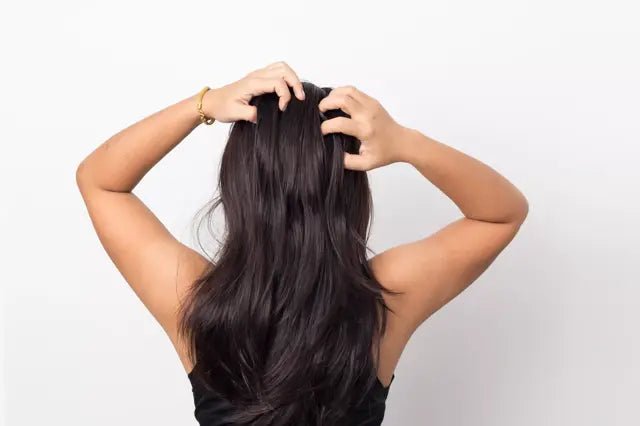CAN BIRTH CONTROL CAUSE HAIR LOSS?

Over 80% of American women have used a reversible method of birth control, like the pill, at some point in their lives. Without a doubt, the side effects of birth control raise many questions in those who use them.
As our hair can make up a large part of our identity, it’s only natural to question whether birth control impacts hair loss. But are some types of contraception more likely to cause hair loss than others?
WHICH BIRTH CONTROL CAUSES HAIR LOSS?
Not all birth control methods use the same types and same levels of hormones.
Generally, using any form of hormonal contraception can throw off the body’s natural hormone levels, which can lead to hair loss. Some women may be more sensitive to the hormones in contraception than others, which can intensify the side effects of birth control.
Let’s explore some of the most widely used types of contraceptives and their effect on hair.
Birth Control Pills and Hair Loss
Oral contraceptives are one of the most used methods of birth control. When taken correctly, they are 99% effective at preventing conception. Birth control pills work by suppressing ovulation, thickening the cervical mucus, and changing the uterine lining to prevent implantation.
Birth control pills come in two forms: the combined and the progestin-only pill (mini pill). The mini pill only contains progestin, whereas the combination pill contains progestin and estrogen. As a result, their side effects may differ. But despite these differences, both the combination and mini pill can lead to hair loss in women. Why? Because both contain the hormone progestin, which is associated with hair loss.
Progestin is a synthetic version of the hormone progesterone. This synthetic hormone has androgenic properties, which means it can cause similar effects as male hormones (keep in mind, the natural hormone progesterone does not have androgenic effects). Due to this property, the pill can lead to various adverse effects, including nausea, headaches, and hair loss.
Hormonal IUD and Implant
Other popular forms of birth control, like progestin implants, injections, hormonal IUDs (intrauterine devices), and vaginal rings, may also contribute to hair loss. For example, the hormonal IUD and the implant may worsen certain conditions, including alopecia.
Contraceptive Injection and Patches
The contraceptive injection (Depo-Provera) has also been associated with side effects like acne, mood swings, and hair loss. Similarly, hormonal skin patches list hair loss as one of their side effects.
All of these are progesterone-only methods of contraception which, similarly to oral contraception, might explain why they contribute to hair shedding.
It is important to reach out to a healthcare professional if you are worried about hair loss when using hormonal contraceptives.
Hormonal Hair Loss
Yet, progestin may not always be the sole culprit of contraception-related hair loss. Some women are genetically predisposed to hair loss or may be hypersensitive to the hormones our bodies are exposed to when using birth control. This reaction can intensify contraception's impact on hair loss.
The Hair Growth Cycle
Hormonal hair loss is partially attributed to the hair growth cycle.
Losing hair is completely normal and part of our natural hair growth cycles. In fact, we lose about 50-100 hairs per day. But in some cases, birth control pills can disrupt the hair cycle and force our hair to move directly from the anagen phase (growth phase) to the telogen phase (when our hair takes a break from growing and starts shedding), skipping the transitional (catagen) phase. This can lead to our hair follicles staying stuck in the resting phase for too long, known as telogen effluvium, during which we are likely to experience increased hair shedding.
Androgenetic Alopecia
Another form of hair loss we may experience when using hormonal contraception is androgenetic alopecia (or male pattern hair loss). This is caused by the synthetic hormones found in different types of birth control (like progestin, the active ingredient in oral contraception), stimulating androgenic activity. Androgens shorten the growth phase of the hair cycle, ultimately creating smaller hair follicles.
Women may experience telogen effluvium and androgenetic hair loss when using hormonal birth control.
It is especially important to pay close attention to how our bodies react to hormones if we have a medical history of female pattern baldness or other forms of alopecia in women.
HAIR LOSS AFTER STOPPING BIRTH CONTROL
Some women may also experience hair loss after stopping birth control. This may be attributed to similar factors that affect the hair during contraception use. Women who have a family history of hair loss or who struggle with hypersensitivity to the hormones in contraception are more likely to experience temporary hair loss after stopping birth control or when switching from one hormonal contraceptive to another.
Some may experience higher levels of hair loss and thinning while on hormonal birth control; meanwhile, others may lose more hair after stopping birth control.
Check with your doctor or healthcare provider if you are concerned about genetic hair loss during any step of your birth control journey.
HOW TO STOP HAIR LOSS FROM BIRTH CONTROL
The good news is that hair loss from birth control is often only temporary. Once your body gets used to the hormones in your contraception method, hair loss should visibly decrease. Similarly, if you've recently stopped birth control, your body will soon regulate internally, and your hair should start appearing fuller again.
But what happens if the issue persists? Switching to a low-androgen birth control method may stop hair loss caused by progestin-based contraceptives. Oral contraceptives that are low on the androgen index have higher estrogen levels. These pills also have lower levels of progestin and, therefore, lower levels of the synthetic hormone that causes hair loss.
On the other hand, some women might prefer switching to a non-hormonal form of birth control, like the copper IUD, diaphragm, or spermicide.
You can talk to your doctor or healthcare professional to find out which nonhormonal option could work best for you.
METHODS TO TREAT BIRTH CONTROL-RELATED HAIR LOSS
You can also follow a few extra steps if you’re using hormonal birth control and experiencing hair loss.
- Eat a balanced diet. Restrictive diets can create nutritional deficiencies which prevent your body from receiving all the essential nutrients it needs for healthy hair growth.
- Replenish your supplements. Vitamin and mineral deficiencies may play a role in your hair loss. Upping your zinc, iron, and B vitamins may also help maintain your general hair health when using birth control.
- Take care of your scalp. Wash your hair regularly and avoid applying harsh chemicals on your scalp to prevent hair thinning.
- Try one of our Nioxin System Kits or thinning hair solutions for women to treat your scalp and hair follicles for fuller-looking hair.
Learn more about hair loss treatments and remedies and how Nioxin products can help if you are struggling with any type of hair fallout. Our range of haircare products and treatments are created to target all types of thinning and hair loss problems, whilst also helping you achieve thicker, fuller-looking hair.
